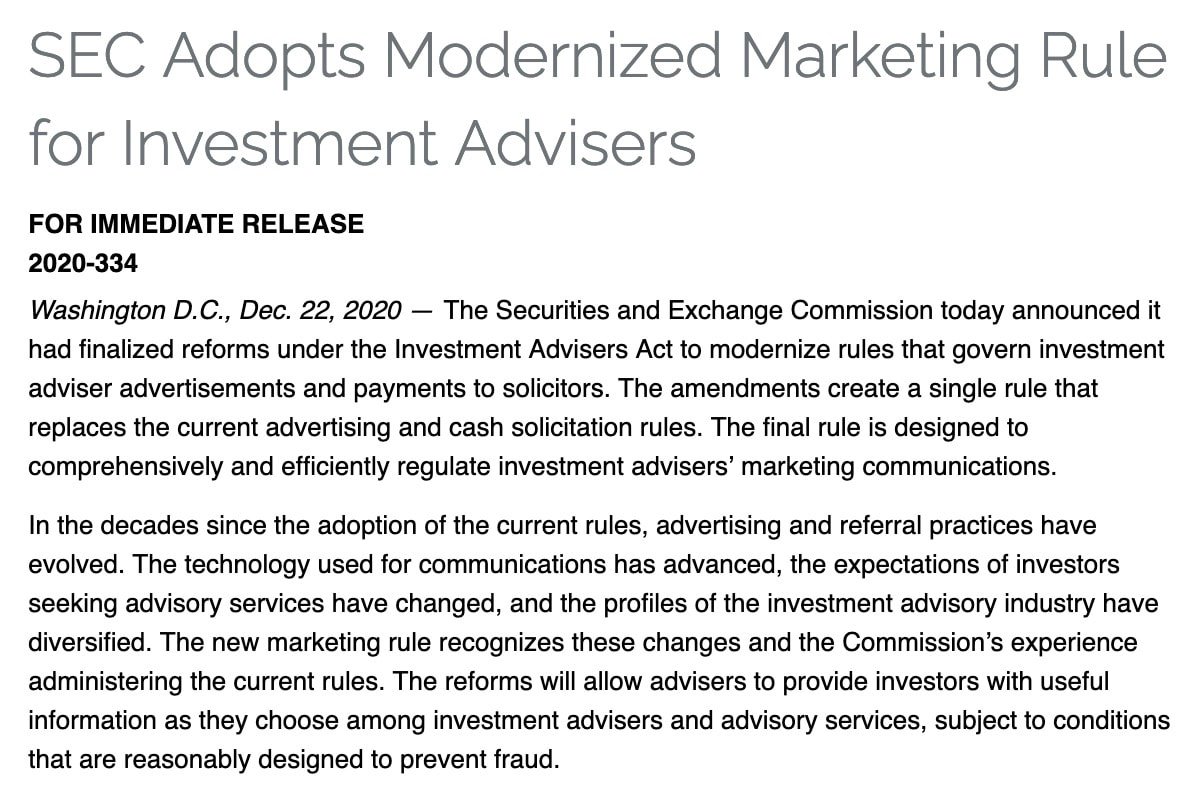|
Financial advisors everywhere are celebrating the new SEC guidelines related to marketing communications. Ho, ho, ho and Happy New Year to all who have been asking for these updates - myself included. Sneaking in right after Christmas and just before a change of administration, the SEC has announced an important rule change that affects all financial advisors. In particular, the SEC has updated a rule that has not been touched in decades and was increasingly out of touch with reality. The change has to do with marketing communications, particularly those through Internet channels. Sam Brownell, CFA, of Stratus Wealth Advisors, Robert Sofia of Snappy Kraken, and I (Marie Swift) provided comments for Ryan Neal, a reporter at Financial Planning magazine, but not all of them made it into that article so I am including the full comments from the three of us here on my blog because I think these are important distinctions. I'll also include a summary of the new rules below. According to Barron’s, “The new regulation also allows financial advisors to use testimonials, endorsements, and third-party ratings to woo potential clients, as long as they meet certain conditions." You can read the Barron's article here: www.barrons.com/articles/sec-takes-advertising-rule-for-financial-advisors-into-21st-century-51608744377 SEC chief Jay Clayton commented that “the marketing rule reflects important updates to the traditional advertising and solicitation regimes, which have not been amended for decades, despite our evolving financial markets and technology. This comprehensive framework for regulating advisers’ marketing communications recognizes the increasing use of electronic media and mobile communications and will serve to improve the quality of information available to investors.” To read the SEC's news release summarizing the new rules, click here: www.sec.gov/news/press-release/2020-334 See additional comments from Sam Brownell, CFA, Robert Sofia and me, below.  Input on the new SEC marketing rule from Marie Swift, President and CEO, Impact Communications, Inc., an award-winning marketing and PR firm that has been working exclusively with independent financial advisors for nearly 30 years: In a recent survey conducted by Impact Communications, 342 independent financial advisors told us that having deeper and more meaningful conversations with clients and using more of an "I care" versus an "I know" marketing strategy is essential to building rapport and trust. Today's digital realities (especially now, given Covid-times) mean that advisors must show they care about their clients' overall well-being, not just that they know their professional stuff. So, when clients and other fans of the advisor want to show their appreciation and/or agreement with the advisor, they naturally want to post something online -- whether that is a comment or a like on a post on Facebook, a reply or a like to a post on Twitter, a rating on Google My Business or Yelp, or a more formal written testimonial on LinkedIn or via email. It's a bad look for the advisor to ignore a show of unsolicited appreciation. And, until now, most advisors were told by compliance consultants and law firms to do nothing to amplify or encourage a lovefest. Even worse, some compliance departments interpreted the prior set of SEC rules to mean that an advisor should not even respond to negative, harmful comments posted to a comment board or online forum - ouch. From a PR perspective, that looks like the advisor is not paying attention, or worse, that they didn't care enough to respond with a simple message such as: "I'm the owner/principal of the firm you mention here. Please call me to discuss. Here's my number. I'll reach out to you again personally as well." The new SEC rules are a breath of fresh air. One has to wonder, what took them so long? Even FINRA has had better guidance, for years. Some IARs and RIAs have been quietly pushing the boundaries while attempting to keep under the radar and avoid trouble. This meant that when a client or strategic partner or business fan wanted to write a testimonial or endorse the advisor on, say, LinkedIn, the advisor had to explain that was not okay due to SEC rules and because the advisor could actually decline to publish the written testimonial (via the settings on LinkedIn) that they were required to do so. But in private conversations, not typically in writing, some advisors would explain that they were so touched by the would-be well-wisher’s comments but since the rules were antiquated they could not accept publicly ... but that if the person really wanted to, they could post something on a site such a Yelp where the advisor had no control over what people said. The new SEC rules are long overdue and will set some firms into a tailspin as they figure out how to play by the rules. The more progressive, nimble firms will have a competitive advantage. The trick will be to balance the desire to amplify the testimonials on their websites, social media, and printed and/or email communications so that they don't come off as braggadocious and slimy. Too much salesmanship is off-putting in a trust-based business. Advisors need to stay focused on demonstrating their expertise, showing they care, and using client-centered messaging. Anything seen as chest-thumping could backfire. And while testimonials are great, they are not magic fairy dust. A thoughtful, strategic marketing plan that hits on four key elements -- paid, earned, shared and owned (the PESO Model) -- in the right proportions, will remain essential.  Input on new SEC marketing rule from Samuel Brownell, CFA, Stratus Wealth Advisors: As a firm that has both an RIA practice and a consulting practice, which focuses on valuation and succession planning, the new SEC marketing rule is a welcome change. It is hard to run coordinated digital marketing when part of our practice (the RIA business) is subject to rules that do not allow testimonials while we could use testimonials for the other part of our practice (the consulting business). Because of this conflict, we had to abide by the stricter RIA marketing rules, lest the regulators could not make a distinction between what was a testimonial for the consulting services versus the RIA services. Further, since many of our clients are both consulting and RIA clients, we felt it was prudent under the old rules to not produce any testimonials. Going forward, the new SEC marketing rule will allow us to develop more in depth testimonials in the form of short case studies that will help prospective clients not only build trust with the Stratus brand but will also help them understand how our valuation, succession planning, and RIA services work together to help independent business owners coordinate their personal and professional goals. Finally, while we are pleased with the rule changes, we also understand that testimonials alone will not drive increased prospect conversion. The testimonials will be one tool we will use to help connect with prospects but ultimately, the most important aspects of business development, such as high quality advice and relationship building, will continue to be vital to successful advisory firms.  Input on new SEC marketing rule from Robert Sofia, CEO, Snappy Kraken, an award-winning system for digital marketing: The SEC's new rule on Investment Adviser Marketing opens up important opportunities for advisers. Those who act to update their marketing, particularly as it relates to incorporating testimonials, will have a significant competitive advantage. The most important question people are trying to answer before choosing an adviser is: Can I trust this person to help me reach my goals? Testimonials are a tried-and-true form of social proof that builds trust and credibility with prospects. An advisor's primary marketing goal should be to transform cold prospects into warm leads as quickly as possible. This is accomplished by exposing them to as many trust and credibility-building signals as possible. Testimonials, proof of historical performance, expert credentials, and genuine thought leadership all help to accomplish this purpose. Until this new rule, the 1961 advertising rule and the 1979 cash solicitation rule held advisors to an antiquated marketing standard that did not keep up with modern, digital marketing best practices. Finally, advisers will be able to market their businesses in the ways consumers are accustomed to interacting with brands. If I were to provide one note of caution for advisers, it would be this: Don't think that adding a bunch of client testimonials to your website is going to solve your marketing problems. The most important and fundamental principles still apply. This is not a hack or a quick fix. Advisers will still need a complete strategy that incorporates all the essential steps of driving awareness, earning email opt-ins, lead nurturing, starting conversations, and deepening relationships. Comments are closed.
|
About
|
|
Stay Connected
|
Phone: 913-649-5009
©2023 Impact Communications, Inc.
|





